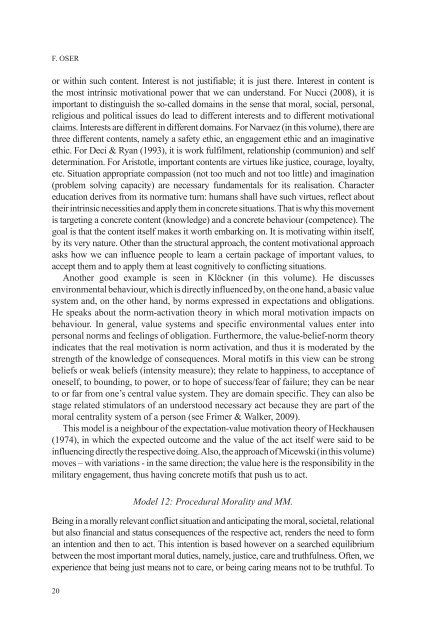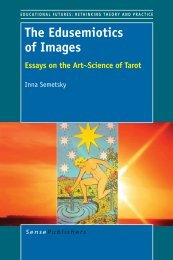Handbook of moral motivation: Theories, models ... - Sense Publishers
Handbook of moral motivation: Theories, models ... - Sense Publishers
Handbook of moral motivation: Theories, models ... - Sense Publishers
- No tags were found...
You also want an ePaper? Increase the reach of your titles
YUMPU automatically turns print PDFs into web optimized ePapers that Google loves.
F. OSERor within such content. Interest is not justifiable; it is just there. Interest in content isthe most intrinsic <strong>motivation</strong>al power that we can understand. For Nucci (2008), it isimportant to distinguish the so-called domains in the sense that <strong>moral</strong>, social, personal,religious and political issues do lead to different interests and to different <strong>motivation</strong>alclaims. Interests are different in different domains. For Narvaez (in this volume), there arethree different contents, namely a safety ethic, an engagement ethic and an imaginativeethic. For Deci & Ryan (1993), it is work fulfilment, relationship (communion) and selfdetermination. For Aristotle, important contents are virtues like justice, courage, loyalty,etc. Situation appropriate compassion (not too much and not too little) and imagination(problem solving capacity) are necessary fundamentals for its realisation. Charactereducation derives from its normative turn: humans shall have such virtues, reflect abouttheir intrinsic necessities and apply them in concrete situations. That is why this movementis targeting a concrete content (knowledge) and a concrete behaviour (competence). Thegoal is that the content itself makes it worth embarking on. It is motivating within itself,by its very nature. Other than the structural approach, the content <strong>motivation</strong>al approachasks how we can influence people to learn a certain package <strong>of</strong> important values, toaccept them and to apply them at least cognitively to conflicting situations.Another good example is seen in Klöckner (in this volume). He discussesenvironmental behaviour, which is directly influenced by, on the one hand, a basic valuesystem and, on the other hand, by norms expressed in expectations and obligations.He speaks about the norm-activation theory in which <strong>moral</strong> <strong>motivation</strong> impacts onbehaviour. In general, value systems and specific environmental values enter intopersonal norms and feelings <strong>of</strong> obligation. Furthermore, the value-belief-norm theoryindicates that the real <strong>motivation</strong> is norm activation, and thus it is moderated by thestrength <strong>of</strong> the knowledge <strong>of</strong> consequences. Moral motifs in this view can be strongbeliefs or weak beliefs (intensity measure); they relate to happiness, to acceptance <strong>of</strong>oneself, to bounding, to power, or to hope <strong>of</strong> success/fear <strong>of</strong> failure; they can be nearto or far from one’s central value system. They are domain specific. They can also bestage related stimulators <strong>of</strong> an understood necessary act because they are part <strong>of</strong> the<strong>moral</strong> centrality system <strong>of</strong> a person (see Frimer & Walker, 2009).This model is a neighbour <strong>of</strong> the expectation-value <strong>motivation</strong> theory <strong>of</strong> Heckhausen(1974), in which the expected outcome and the value <strong>of</strong> the act itself were said to beinfluencing directly the respective doing. Also, the approach <strong>of</strong> Micewski (in this volume)moves – with variations - in the same direction; the value here is the responsibility in themilitary engagement, thus having concrete motifs that push us to act.Model 12: Procedural Morality and MM.Being in a <strong>moral</strong>ly relevant conflict situation and anticipating the <strong>moral</strong>, societal, relationalbut also financial and status consequences <strong>of</strong> the respective act, renders the need to forman intention and then to act. This intention is based however on a searched equilibriumbetween the most important <strong>moral</strong> duties, namely, justice, care and truthfulness. Often, weexperience that being just means not to care, or being caring means not to be truthful. To20














